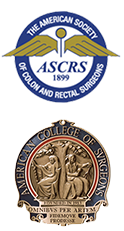Crohn's Disease
Crohn's disease is a chronic, relapsing inflammatory process that primarily involves the intestinal tract, but may have extra-intestinal manifestations as well. Crohn’s disease can occur at any location throughout the entire tract from the mouth to the anus which is in contrast to Ulcerative Colitis which involves only the large intestine, starting in the rectum and progressing proximally in a continuous fashion. By far, the most common sites of occurrence are within the last part of the small intestine (terminal ileum) and/or the large intestine (colon and rectum). Crohn’s disease tends to occur in a chronic, relapsing fashion with symptomatic periods interspersed between periods of remission, which may last for months to years.
What are the risk factors for Crohn’s Disease?
The disease occurs equally among men and women and usually presents between the ages of 16 and 40 years old. About 20% of those affected will have a relative with either Crohn’s disease or Ulcerative Colitis (another type of inflammatory bowel disease). Interestingly, this disease is more common in people living in northern climates. This pattern suggests that both a genetic and an environmental component are necessary to trigger the development of Crohn's disease.
What causes of Crohn’s Disease?
The exact cause of the disease is, as of yet, unknown. Current and past research suggests that a person’s immune system may have a genetic predisposition to overreacting to an environmental or bacterial insult to the gastrointestinal tract. This over-amplification of one’s immune response to the offending agent sets up a spiral of inflammation that is injurious to the lining and, eventually, the entire thickness of the portion of the intestinal tract that it is attempting to protect.
What are the symptoms of Crohn’s disease?
Crohn’s disease often has a gradual onset with initially subtle symptoms which depend on the portion of the gastrointestinal tract that is affected. When the terminal ileum is involved abdominal pain, bloating and cramping are common. Diarrhea and bleeding per rectum tend to occur with either colonic or rectal involvement. Other symptoms may include anal pain or drainage, skin lesions, anal abscess, painless anal fissures and arthritis.
How is Crohn’s Disease diagnosed?
A detailed interview by your primary physician, gastroenterologist or surgeon will often lead to the suspicion of inflammatory bowel disease. Laboratory tests, imaging studies and direct visualization of the intestinal tract with colonoscopy, upper endoscopy or wireless capsule studies (miniature cameras swallowed in pill form) are used to confirm the diagnosis and assess the extent/severity of the disease.
How is Crohn’s Disease Treated?
Medical management with a variety of drugs is the backbone of therapy. Various medications are used to achieve two goals: 1) the suppression of symptoms from the initial attack or subsequent “flare-ups” and 2) maintaining remission (i.e. lengthening the period between flare ups). Currently, there is no cure for Crohn’s disease and surgery is ultimately required at some point in up to 75% of patients.
Surgery is required if medical management fails to resolve symptoms or for complications of the disease such as perforation or blockage of the bowel, significant bleeding, abscess or fistula formation (abnormal connections between the intestine and neighboring organs) and severe anal disease. Although surgery can not cure the disease, it is often the best option for managing complications of the disease and achieving relief of symptoms in many patients. This decision should be made with discussions between yourself, your medical doctor and your surgeon. Crohn’s disease is a complex and, often, trying disease to live with and manage. If surgical intervention is being considered consultation with a surgeon specialized in Colon and Rectal Surgery has been shown to improve patient outcomes.





